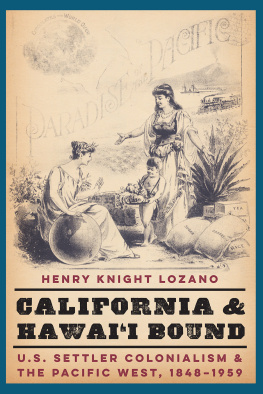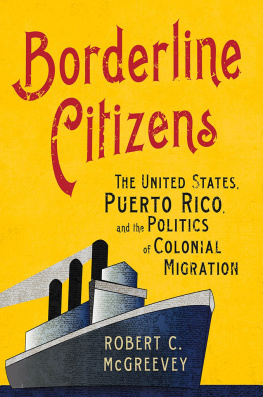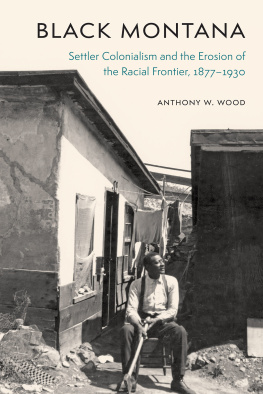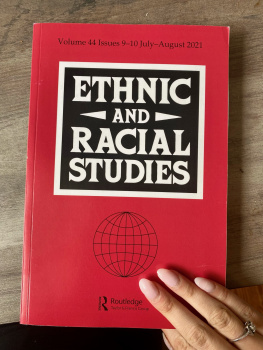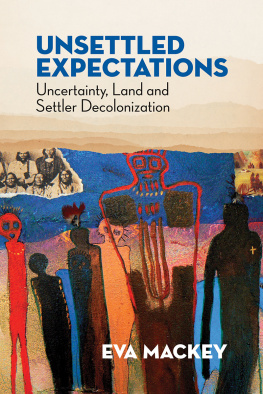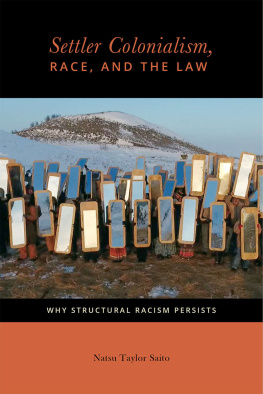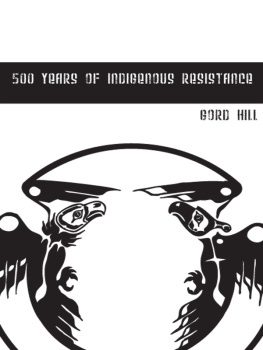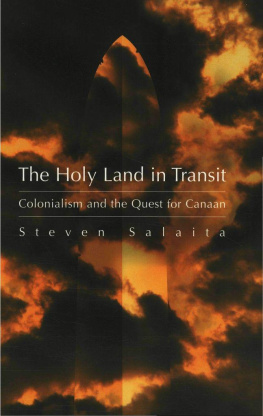FORMATIONS OF UNITED STATES COLONIALISM
ALYOSHA GOLDSTEIN, editor
Duke University Press
Durham and London
2014
2014 Duke University Press
All rights reserved
Printed in the United States of America on acid-free paper
Typeset in Scala and Meta type by BW&A Books, Inc.
Library of Congress Cataloging-in-Publication Data
Formations of United States colonialism / Alyosha Goldstein, editor.
pages cm
Includes bibliographical references and index.
ISBN 978-0-8223-5796-4 (hardcover : alk. paper)
ISBN 978-0-8223-5810-7 (pbk. : alk. paper)
ISBN 978-0-8223-7596-8 (e-book)
1. United StatesTerritories and possessionsHistory.
2. ColonizationHistory.
3. ColoniesHistory. I. Goldstein, Alyosha.
JV527.F67 2014
325.373dc23
2014026095
Cover art: Merritt Johnson, Blowing Out the Border (Sonoran Desert) (detail), courtesy of the artist.
Title page art: Map of the Route pursued in 1849 by the US Troops... , in an expedition against the Navajo Indians. Drawn by Edward Kern. Photo Courtesy of the Newberry Library, Chicago.
CONTENTS
Introduction | ALYOSHA GOLDSTEIN
Toward a Genealogy of the U.S. Colonial Present
Chapter 1 | JOANNE BARKER
The Specters of Recognition
Chapter 2 | BERENIKA BYSZEWSKI
Colonizing Chaco Canyon: Mapping Antiquity in the Territorial Southwest
Chapter 3 | MANU VIMALASSERY
The Prose of Counter-Sovereignty
Chapter 4 | J. KHAULANI KAUANUI
A Sorry State: Apology Politics and Legal Fictions in the Court of the Conqueror
Chapter 5 | BARBARA KRAUTHAMER
Missionaries, Slaves, and Indians: Fragmented Colonial Exchanges in the Early American South
Chapter 6 | AUGUSTO ESPIRITU
American Empire, Hispanism, and the Nationalist Visions of Albizu, Recto, and Grau
Chapter 7 | LORENA OROPEZA
Becoming Indo-Hispano: Reies Lpez Tijerina and the New Mexican Land Grant Movement
Chapter 8 | FAANOFO LISACLAIRE UPERESA
Seeking New Fields of Labor: Football and Colonial Political Economies in American Samoa
Chapter 9 | DEAN ITSUJI SARANILLIO
The Kpaniwai (Damming of the Water) Heritage Gardens: Alternative Futures beyond the Settler State
Chapter 10 | JULIAN AGUON
Our Stories Are Maps Larger Than Can Be Held: Self-Determination and the Normative Force of Law at the Periphery of American Expansionism
Chapter 11 | LANNY THOMPSON
Governmentality and Cartographies of Colonial Spaces: The Progressive Military Map of Porto Rico, 19081914
Chapter 12 | JENNIFER NEZ DENETDALE
Im Not Running on My Gender: The 2010 Navajo Nation Presidential Race, Gender, and the Politics of Tradition
Chapter 13 | VICENTE L. RAFAEL
Translation, American English, and the National Insecurities of Empire
INTRODUCTION
Toward a Genealogy of the U.S. Colonial Present
ALYOSHA GOLDSTEIN
The United States of America has never been a uniform or unequivocal geopolitical entity. This is not merely a consequence of prevailing forms of federalism, demographic heterogeneity, or regional particularity. This is not simply a matter of an unavoidable gap between empirical description and the ideal form of the nation-state. Rather, the United States encompasses a historically variable and uneven constellation of state and local governments, indigenous nations, unincorporated territories, free associated commonwealths, protectorates, federally administered public lands, military bases, export processing zones, colonias, and anomalies such as the District of Columbia that do not comprehensively delineate an inside and outside of the nation-state. The heterogeneity of this condition is not exceptional to the United States. But even with a burgeoning scholarship scrutinizing U.S. empire and calls for a postnationalist American studies, a critical analytic lens that takes into account the significance of colonialism for the various ways in which the geopolitical configuration of the United States has changed over time remains largely absent.
Rather than simply advocating a comparative approach that centers colonialism, this collection cumulatively argues that analyzing U.S. colonialism demands understanding U.S. empire and the imperial nation-state as itself a comparative project and mode of power. Always already shaped by fluctuating interimperial rivalries and counterclaims against the peoples it subsumes, U.S. colonialism has been neither monolithic nor static. The United States nevertheless remains reliant on the ever-expanding dispossession and disavowal of indigenous peoples, global circuits of expropriated labor, The essays collected here do not subscribe to a mode of comparison whose objective is to establish a norm of colonial power and practice by which different historical cases can be comparatively juxtaposed and evaluated. Instead this book argues that it is precisely the complex reciprocities, seemingly opaque disjunctures, and tense entanglements evident in the diversity of U.S. colonial pasts and presents that reveal the epistemological antagonisms and affinities that offer new insights for anticolonial struggle and new possibilities for critical inquiry.
Bridging the study of North American settler colonialism and U.S. overseas occupation provides a means with which to address both the incongruities and fault lines of the U.S. nation-state and the determined construction of national singularity, coherence, and continuity. Debates about globalization over the course of the last four decades have grappled with an increasing sense of the diminished sovereignty of nation-states, while historical studies of nationalism and nations have similarly highlighted the ways in which the political, economic, and cultural forms of society are porous and contingent. Nevertheless, as contemporary conflicts over immigration reveal with particular intensity, popular investments in the modular nation form and claims to a discrete and territorially delimited political community have definite material force. Likewise, escalating state and municipal fiscal crisis has been paralleled by the proliferation of the U.S. military-surveillance complex throughout the world. The nation-state need not actually be unitary or cohesive in order to decisively enact juridical power domestically and exercise coercion at home and abroad. In this sense, the United States serves here as a volatile assemblage and shifting empirical configuration that cannot adequately contain or circumscribe scholarly inquiry, but that has nevertheless insinuated and asserted its authority in ways that resist being undone by mere exposure or repudiation.
The overlapping, sedimented, and variable conditions and practices of It is precisely this temporal closure, necropolitical teleology, and complicit blindness to the sustained political, social, cultural, and legal contention by indigenous peoples in the United States that so often continues to diminish and hinder the capacity for scholars, activists, and legislators to productively examine the consequences and interconnections of U.S. colonialism as they have varied across time and place, but never in fact been fully concluded or resolved.
The chapters in this book thus consider the multifaceted claims, exclusions, and disavowals of the United States as it has been constituted with
This book underlines the complicities, adaptations, and antagonisms that interconnect global, national, regional, and local relations of power. Indeed, the exigencies of our present moment provide an especially auspicious occasion through which to reconsider colonial formations within and with regard to the United States. From this vantage point we can generatively think through a series of questions. How might the diversity of colonial pasts, settler claims, territorial annexations, and overseas occupations be understood in relation to one another? How have specific normative forms of jurisprudence, racialization, violence, militarism, politics, property, and propriety served to at once facilitate and delimit the conditions of colonial dispossession? How and why do these formations matter now? Addressing these questions, this volume examines the specific iterations and consequencesof U.S. colonialism as a dynamic historical assemblage with significance for understanding current conditions of social and political possibility.



